- About
- Events & Activities
Events & Activities
- Learning Centre
- Cultural Maps
Cultural Maps
- Mapping Heritage Resources
- Submerged Heritage Resources Map
- Columbia Basin Region Historic Places Map
- Francophone Historic Places Map
- Chinese Canadian Historic Places Map
- Japanese Canadian Historic Places Map
- South Asian Canadian Historic Places Map
- War Monuments and Memorials Map
- Industrial Heritage Cultural Map
- Funding
- News
- Professional Development
Professional Development
- Contact
- Heritage 101
- Advocacy
- Accessibility for Historic Places
- Climate & Sustainability
- Heritage Place Conservation
- Heritage Policy & Legislation
- Homeowners
- Intangible Cultural Heritage
- Non-For-Profit Organizations
- Reconciliation
- Indigenous Cultural Heritage
- Setting the Bar: A Reconciliation Guide for Heritage
- 1. Heritage and Reconciliation Pledge
- 2. Acknowledging Land and People
- 3. Celebrating Days of Recognition and Commemoration
- 4. With a Commitment to Learn
- 5. Committing to Strategic Organizational Diversity
- 6. Mission-Making Room for Reconciliation
- 7. Possession, Interpretation, Repatriation and Cultural Care
- 8. Shared Decision Making
- 9. Statements of Significance and other heritage planning documents
- 10. Heritage Conservation Tools, Local Government Act
- Racism: Do Not Let the Forgetting Prevail
- Taking Action: resources for diversity and inclusion
- Webinars On-Demand
Intangible Cultural Heritage: A Resource Guide
Tangible and intangible heritage may be very different, yet they can also be so interconnected that they can be described as two sides of the same coin. Carrying meaning and the embedded memory of humanity, tangible and intangible heritage rely on each other when it comes to understanding their meanings and importance.
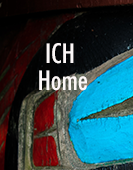 |
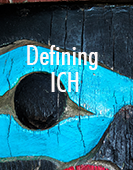 |
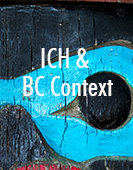 |
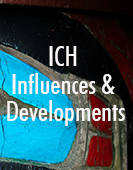 |
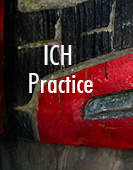 |
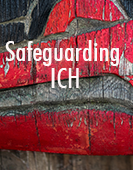 |
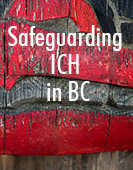 |
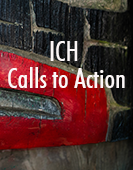 |
Yet even as our understanding and practice of heritage evolves, there is still a tendency to explain heritage through visual and tactile interactions. It is for that reason, no doubt, that UNESCO recommended heritage sites develop new ways to bring together movable and immovable, tangible and intangible, natural and cultural heritage and “[to] develop documentation tools and standards in establishing holistic museums and heritage practices.”
In BC, our heritage conservation tools, inscribed in legislation, have not evolved in the same ways, leading heritage guardians to ask, “How do we recognize intangible heritage in a tangible environment?”
We asked three experts to explore this question and the new directions from around the world and practices right here at home. The conversation with Katharine Turvey, George P. Nicholas, and Agnieszka Pawlowska-Mainville took place during the 2021 conference on May 27.
Key Messages
-
Access to and control over one’s own heritage should be seen as a basic human right; it is essential to an individual’s (or group’s) well-being identity, history, and worldview.
-
ICH is as much about the past, as it is about the present. It may not be seen, but it is immensely powerful. Objects, artifacts, places have no meaning without the values that are ascribed to them by people today or in the past.
-
Intangible cultural heritage (ICH) is a fruitful tool for Canadian heritage policy. Canada can aid communities and families safeguard their heritages by adhering to the principles outlined in the UNESCO 2003 Convention, and by ratifying it.
-
We need to learn from some of the best international practices. For policy development, we need to think about transmission. We need to adopt legislation and international policies, and we need to be creative in our approaches to policy development.
-
ICH can serve as an effective mechanism for communities to protect their cultural heritage. Don’t make assumptions, but rather, assume that you do not know. Acknowledge people as people when establishing relationships.
-
The discourse of ICH can serve as the next step in reconciliation between Indigenous people and Canada. To help us move forward, I think that each of us has a responsibility to read carefully and understand the provisions of UNDRIP and of the Truth and Reconciliation Commission’s recommendations.
At the time of the 2021 conference, Katharine Turvey had been working with UNESCO for several years, including three years with the Canadian Commission for UNESCO (CCUNESCO) as the Programme Officer for Culture. With CCUNESCO, she coordinated activities for the International Year of Indigenous Languages, convened conversations on climate action in the cultural sector, and prioritized key themes in Indigenous cultural heritage. Katharine is also a pun master and music lover who holds degrees in art history and Indigenous policy. In the fall of 2021, Katharine joined the secretariat of the International Council of Museums (ICOM) as a coordinator for decolonization and sustainable development.
George Nicholas is Professor of Archaeology, Simon Fraser University (SFU). He has worked with and for Indigenous peoples in North America and elsewhere for over thirty years, and he developed and directed the premier Indigenous archaeology program in Canada at SFU’s former Kamloops campus (1991–2005). His research interests and publications include a focus on Indigenous archaeology, heritage as a human right, cultural appropriation, and archaeology in pursuit of social justice. Nicholas directed the Intellectual Property Issues in Cultural Heritage (IPinCH) Project (2008–2016), a major international research initiative that systematically explored ethical archaeological and heritage research worldwide. Through this and other initiatives, he has made significant contributions to cross-cultural understandings of heritage. He is former editor of the Canadian Journal of Archaeology and former series co-editor for the World Archaeological Congress’s Handbooks in Archaeology series. His books include Being and Becoming Indigenous Archaeologists (2010), and he has published widely on Indigenous archaeology, intangible heritage, Traditional Knowledge, and many other topics.
Agnieszka Pawlowska-Mainville is an Associate Professor in First Nations Studies at the University of Northern British Columbia. She examines customary governance, sustainable livelihoods, land-based practices, and folklore through intangible cultural heritage. She works with numerous Indigenous communities across Canada and researches traditional land-based practices in Poland. Her work aims to support the process of cultural heritage transmission to future generations. She completed her M.A & Ph.D. at the University of Manitoba and earned her B.A. from McGill University. Dr. Pawlowska-Mainville’s most recent articles discuss weaving Dakelh and academic pedagogies through moose-hide tanning (2020), as well as a chapter on the Anishinaabeg boreal forest food system (2020). She is currently a Lead Author on the IPBES Values Assessment, an Expert Member on UNESCO’s International Committee on Intangible Cultural Heritage. Agnieszka is a member of the International Committee on Intangible Cultural Heritage ICOMOS.
